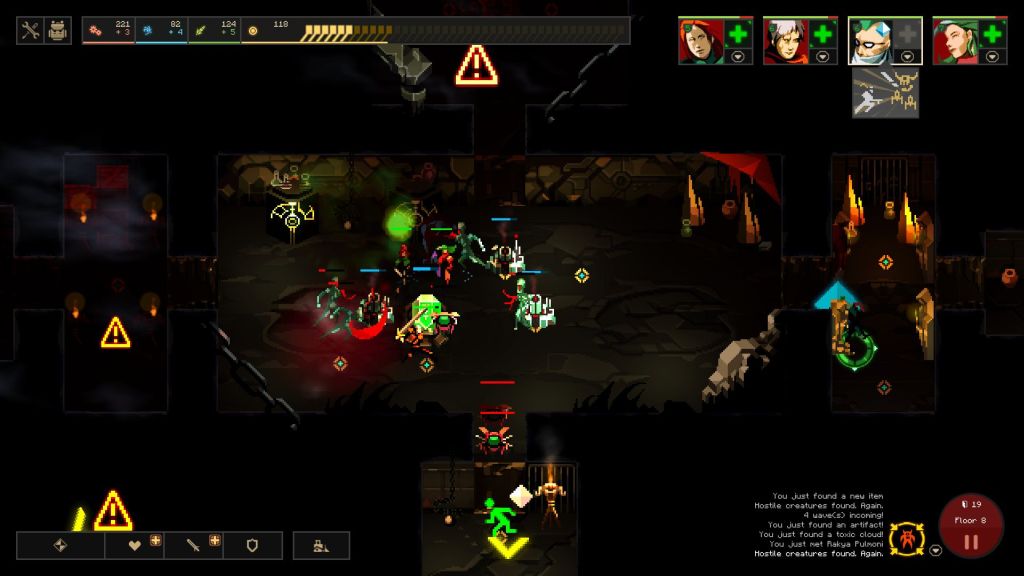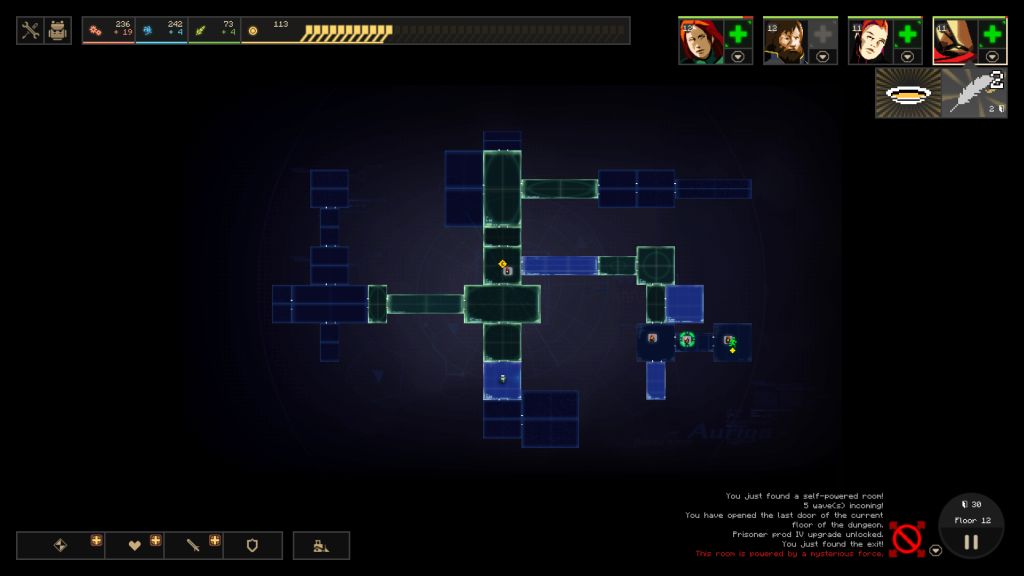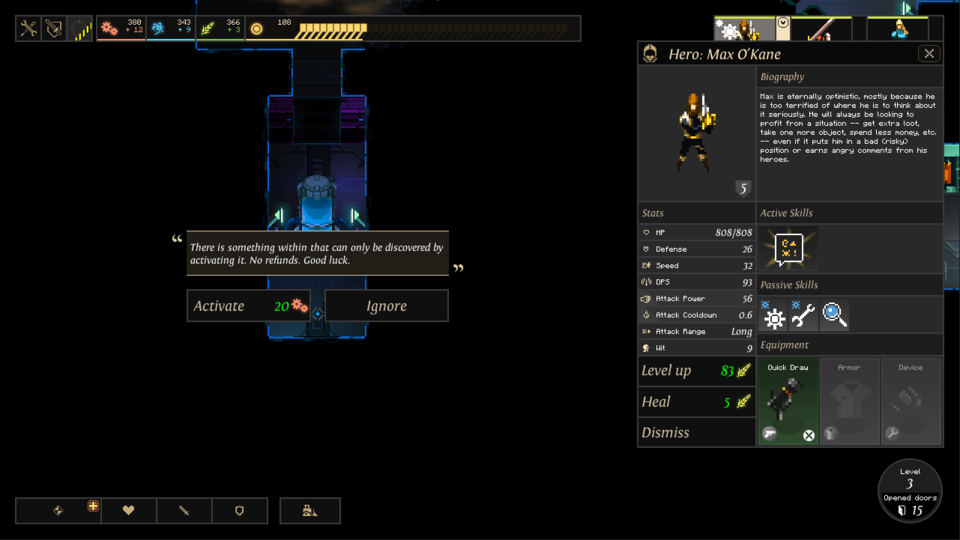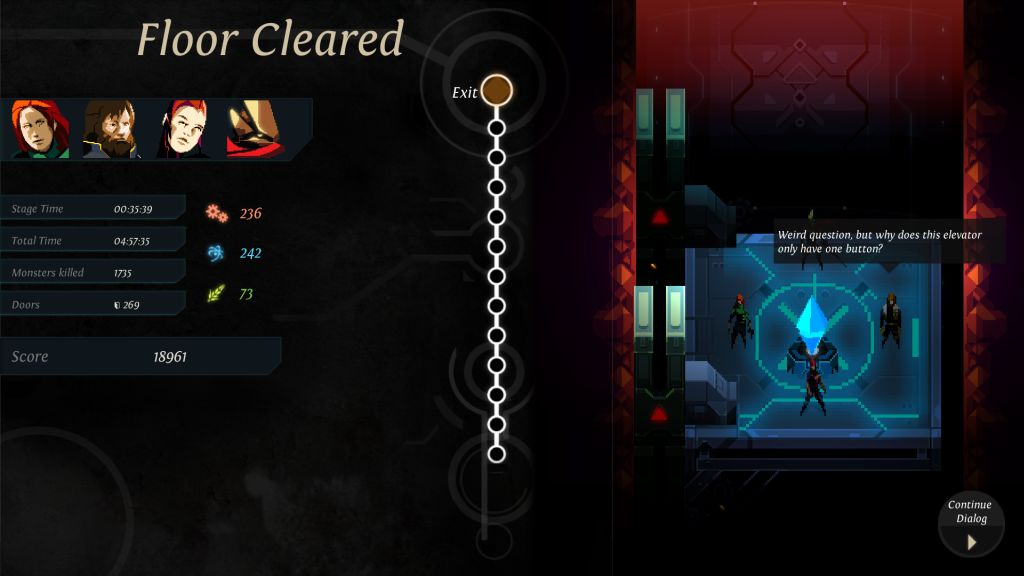

This is my short review of Dungeon of the Endless (DOTE), a unique indie game released by Amplitude Studios in October 2014. DOTE features an unusual mashup of gameplay from several different genres, incorporating aspects of perma-death and procedurally generated levels from roguelike games, hero management similar to League of Legends or DOTA, resource economy management out of a turn-based strategy game, and finally tower defense gameplay as well. It's a bizarre mix, and I can't say that I've ever encountered anything quite like DOTE before. While all of this doesn't entirely fit together into a cohesive whole, at the very least it's an intriguing experiment. Here's an introductory video that I put together showing the basics of the gameplay, and another pairs of links to a longer full game played out on Livestream.

Let me start by describing the gameplay. DOTE starts with your characters crash-landing on an alien planet, finding themselves at the bottom of a dungeon full of monsters. Your goal is to guide them through twelve floors to reach the exit from the labyrinth, with increasingly deadly obstacles on each successive floor. You begin with two starting characters, and can recruit up to two more by finding them along the way. Heroes begin at Level 1, and can increase to a maximum of Level 15 through the use of one of the game's resources. Heroes gain additional stats for each extra level, along with new abilities (both passive and active). Then can be further customized through the equipment of weapons, armor, and accessories, which can be found or bought along the journey.
Sharing focus with the heroes in DOTE are something known as "modules". These are places where you can put down structures, either resource-generating ones to power your economy or defensive towers to shoot back against invading enemy hordes. The first of these two groups is officially called "major modules". Rooms that have major module slots (which are not always present) can be used to produce extra Industry, Science, or Food. You will receive these resources every time that you open a door to a new room, which fuctions as the beginning of a new random encounter (much like visiting a new beacon in FTL). Basic strategy in DOTE involves getting down some Industry and Food generators ASAP at the start of each new floor to start powering your economy. Each room may or may not also have slots for "minor modules", which is where players can place defensive towers of some kind to shoot at the monsters or provide some other benefit. These towers become critically important as the game progresses, as the enemy floods become too strong for your heroes to deal with them on their own. Good tactical play involves picking the right battleground for your heroes to fight with the benefit of towers supporting them.
Of course, you can't simply build major and minor modules anywhere that you want. Both of them require the room to be powered using another one of the game's resources known as "Dust" (the yellow circular symbol in the picture above). Monsters can only spawn in unpowered rooms, so knowing which rooms to power and defend, and which rooms to leave dark, forms the basis of DOTE strategy. Dust is almost certainly the most important resource in this game, as floors that produce an excess of Dust tend to be extremely easy. You wind up facing very few enemies when that happens. On the other hand, sometimes you run a critical shortage of Dust, and those critters are just spawning EVERYWHERE. There are three other resources in total. Industry (the red gear symbol) is used to build major and minor modules. You need a lot of industry in this game, don't neglect it. Food (the green wheat symbol) is used to recruit new heroes, level up your current heroes, and carry out emergency heals in mid-battle. Food is also extremely important, make sure to have plenty on hand. The fourth and least important resource is Science (the blue energy symbol), which is used to research improved modules over the course of the game (and can also be used to refresh the cooldown of hero abilities in combat). This aspect of the gameplay isn't as well fleshed out as it could be, and I typically find that I near far less science than anything else.

All of this stuff sounds great on paper, and there are some aspects of DOTE that work well indeed. Figuring out which rooms to power and what modules to build can make for some tough choices at times. The dungeon floors are all randomly generated, so you'll always be forced to make plans on the fly as you open each door. Strategy is generally based around two major elements: knowing what modules to put down (and where) in the economic side of the game, and then defending them through controlling monster spawns in the tactical side of the game. Enemies will not spawn in rooms that have been powered, or in rooms where a hero is standing, which gives the player a good deal of latitude over their appearance. Once the player gets past the "OMG monsters are everywhere!!!" phase, he or she can begin actively planning around where they'll appear, and how to deal with them when they do. This can be a lot of fun. 
DOTE also has an excellent minimap system that helps enormously in understanding what's taking place. I found myself spending most of the game on the minimap screen, which was almost a shame because it wasted the pixel artwork on the default screen. You can't really focus on the cool fighting animations because you need to be watching your hero lifebars and ability cooldowns during the combat phase of each turn. (Fortunately this game can be paused at any time, again much like FTL. Pausing often is highly encouraged.) Oh, and have I mentioned that this game is hard? Brutally, painfully hard? There are only two difficulty levels in DOTE, which the designers have trollingly named "Too Easy" and "Easy". I hate this decision, as the "Easy" difficulty is nightmarishly tough to complete and the stupid name causes all kinds of confusion. You'll need to know exactly what you're doing to have any shot at winning this game. (DOTE needs a middle difficulty level quite badly, as the lower one is indeed rather simple for an experienced player, while the higher difficulty is just masochistic.) You won't be winning this game on the first try. Expect to need some trial and error to succeed.
Those are the positive aspects of the gameplay. As I suggested, however, there are a number of problems with DOTE that cause the whole to be less than the sum of its individual parts. The first problem is one of pacing. The dungeon lasts for 12 floors, but there isn't enough content in this game to justify that length. It only takes about eight floors to get a full team of four heroes, equip them all with weapons and armor, level them up sufficiently, and research all of the module upgrades using the science resource. You've got your team more or less maxed out, and the game just keeps going on and on in, well, endless fashion. The last few floors DRAG very noticeably. It gets quite boring to play. The designers try to make these last few floors harder by giving you fewer resources to work with: less Dust so fewer rooms can be powered, fewer module slots to weaken your economy, more doors to open to find the exit to the next floor, and so on. Now this is harder, true enough, and the last floor in particular can be absolutely brutal. But the gameplay isn't changing one iota. You're doing the exact same thing on each floor, just being forced to do it with fewer and fewer resources. There just isn't enough content in DOTE to justify having so many floors. Imagine if FTL had no rebel flagship to fight, and instead added four more sectors to travel through, with each one giving you less and less scrap rewards. Yes, it would be challenging to complete, but would it be fun and interesting to play? Not really. That's the situation with DOTE.

Another major problem lies with the heroes in this game. The heroes do have major differences between them, and some of them are much stronger choices than others. However, the heroes ultimately don't seem to have that much effect on how the game functions in practice, because once again you tend to be doing the exact same thing on floor after floor after floor. Some heroes simply do it much better than others. You might play one game with a tank character, another with a glass cannon DPS character, another with an economic-oriented character, and so on. But again, the big picture strategy of building the resource economy and controlling monster spawns never really changes. Because I was doing the same thing strategically in every game, the tactics of each combat round (which do change depending on the heroes) didn't ultimately matter very much. This is further compounded by the way in which the minor modules, the tower defense part of the game, tend to overshadow the heroes on the later floors. Your characters can be quite frail in DOTE, and they stand little chance of stopping enemy waves on their own at the end of the game. This is how the gameplay is supposed to work - I mean, there's no point in having the tower defense aspect otherwise - but it makes the heroes almost redundant on the final few floors. Anyone could be standing in those rooms preventing the spawns from occuring. The towers are going to be doing most of the killing when the hordes show up. I actually played a full game with a solo character (on the lower difficulty), and I found that the towers could handle things more or less on their own without any need for the heroes at all. This did much to kill the replayability factor for me.
Finally, this game can be difficult for all of the wrong reasons.  There's a lot of cheap stuff in DOTE that makes the game harder for the sake of making it harder. There are crystalline monsters that will deliberately go after your major modules, which would pose an interesting challenge except for two things. Number one, they destroy your modules way too fast, in as little as five hits, and I've seen floors where as many as a dozen of them spawned at once. Good luck keeping your modules alive when that happens! Number two, you don't directly control your heroes in combat, which means that it's impossible to tell them to focus fire or prioritize certain enemies. This is a huge problem when facing special monsters. On the higher difficulty level, where you are painfully constricted on resources, this is a complete dick move on the part of the designers, as it's literally impossible to protect your modules from destruction at times. There are also suicide monsters who blow themselves up, causing immense damage to your heroes and your modules. I've had two of them explode simultaneously on me, insta-killing a hero who was at full health. Again, this is needlessly cheap and frustrating, especially in a game where you can't tell your heroes which opponents to attack! (Monster documentation is also awful; you can't click on individual monsters in-game, and there is zero information about their stats or abilities.) There are plenty of ways to create challenging gameplay without venturing into poor game design, and too often DOTE ventures into Fake Difficulty territory.
There's a lot of cheap stuff in DOTE that makes the game harder for the sake of making it harder. There are crystalline monsters that will deliberately go after your major modules, which would pose an interesting challenge except for two things. Number one, they destroy your modules way too fast, in as little as five hits, and I've seen floors where as many as a dozen of them spawned at once. Good luck keeping your modules alive when that happens! Number two, you don't directly control your heroes in combat, which means that it's impossible to tell them to focus fire or prioritize certain enemies. This is a huge problem when facing special monsters. On the higher difficulty level, where you are painfully constricted on resources, this is a complete dick move on the part of the designers, as it's literally impossible to protect your modules from destruction at times. There are also suicide monsters who blow themselves up, causing immense damage to your heroes and your modules. I've had two of them explode simultaneously on me, insta-killing a hero who was at full health. Again, this is needlessly cheap and frustrating, especially in a game where you can't tell your heroes which opponents to attack! (Monster documentation is also awful; you can't click on individual monsters in-game, and there is zero information about their stats or abilities.) There are plenty of ways to create challenging gameplay without venturing into poor game design, and too often DOTE ventures into Fake Difficulty territory.

What would I do to try and fix some of these problems? So kind of you to ask that rhetorical question, dear reader!  Let's venture into some potential solutions. First of all, I would make the Infirmary Pod the default setup instead of the current Escape Pod. On the default setting, your characters have lower health totals but they insta-heal back to full after each combat round. With the Infirmary Pod, the characters have double the HP, but any damage that they take will remain for the rest of the floor unless being healing by consuming Food. This is a far better gameplay setup, since it turns Health into a resource to manage as well (creating much more of a survival horror feel) while also vastly toning down the cheap insta-kills in the default setup. I'm genuinely not sure why the designers made this choice.
Let's venture into some potential solutions. First of all, I would make the Infirmary Pod the default setup instead of the current Escape Pod. On the default setting, your characters have lower health totals but they insta-heal back to full after each combat round. With the Infirmary Pod, the characters have double the HP, but any damage that they take will remain for the rest of the floor unless being healing by consuming Food. This is a far better gameplay setup, since it turns Health into a resource to manage as well (creating much more of a survival horror feel) while also vastly toning down the cheap insta-kills in the default setup. I'm genuinely not sure why the designers made this choice.
Secondly, I would significantly shorten the number of floors. This was a complaint I was voicing from my very first playthrough, and it all comes back to the pacing issue. There simply isn't enough content in this game to fill out 12 floors. I think that 8 floors would be a better fit, or 10 floors at the absolute most. Next I would add some kind of a final boss to overcome at the end of the game, in the same way that FTL has the rebel flagship to contend with. What if DOTE had 8 floors of steadily increasing difficulty, and then a 9th floor at the end where your heroes had two minutes to set up defensive modules before getting hit with wave after wave of incoming enemies? You could call it "The Flood" or something like that. Then the whole game would be a process of building up your team and upgrading your modules to prepare for this final obstacle, and there would be a real thrill of victory in overcoming it and escaping the dungeon. As it stands right now, you walk out the final exit on the last floor in DOTE... and nothing really happens. Static victory splash screen, ummm, yay? You can even beat the game while fighting almost no monsters at all if you're lucky enough to find the exit quickly on the last few floors. I would definitely steal a page from FTL here, and create a version of the rebel flagship for DOTE. The current system is incredibly anticlimactic and luck-based.
Finally, I would introduce more scaling into the game. Right now, your heroes don't actually get that much stronger over the course of the game. Oh they get additional abilities and they're certainly better at higher levels, but the overall scaling is fairly modest. Characters will typically increase their DPS rating by about 2x to 3x the starting value in going from Level 1 to Level 15, and other stats work in a similar ratio. This is kind of weird because finding or buying a single weapon can also double the DPS rating quite easily. In other words, you can spend thousands of Food upgrading your character 14 times... or you can open a random treasure chest and find something that has the same effect on damage. It seems a bit off, right? In discussing this issue with antisocialmunky at Realms Beyond, he mentioned that he didn't worry too much about upgrading his characters and focused more on Industry than on Food, not caring as much about his character levels. He was right in this analysis: there's not that much difference between heroes at Level 8 and heroes at Level 12. You're generally better off sinking those resources into more Industry to have more towers on hand.
The gameplay shouldn't work that way! This is a hero-based game, so the heroes should scale much harder than they do. I'm thinking more along the lines of Civ4 here, where a brand new city (or in this case a Level 1 hero) should be almost useless, while a maxed out capital (i.e. Level 15 hero) can carry entire games. Instead of heroes scaling to roughly 2x-3x the starting value across 14 levels, they should scale more like 20x-30x the starting value. Make it so that if you get to the lategame with underpowered characters, because you didn't manage the economic aspect of the game well enough, you will get CRUSHED on the final boss floor. This is exactly how FTL works, of course, and I've seen lots of people on Livestream who didn't know what they were doing run to the last sector with wildly underpowered ships and then get destroyed by the rebel flagship. DOTE should work on a similar model. The module system should also scale much harder as well, with the starting towers being far weaker in comparison to the ending towers. Right now, the upgraded tier four towers are just about twice as good as the starting tier one versions. I would make them about five times as good! This would make science far more important as a resource, because you would simply have no chance if you didn't upgrade your modules properly along the way. (I would also rework the whole research system to make it less random. Under this theoretical system, you would NEED those upgrades to have any chance of winning, so they couldn't just be found randomly at the current science crystals.) Long story short, the whole game would revolve around upgrading your heroes with Food and your modules with Science to have them strong enough to face the final boss floor at the end. That would be a more interesting game to play, because the gameplay would be DIRECTED towards something. As it is now, DOTE doesn't lead anywhere, which is why it gets so tedious on the last few floors. The developers thought that the solution was to make those floors really, really hard. Unfortunately, that's not a compelling answer.

I'm probably finished with this game now, which is why I wanted to type up my impressions while they were still fresh in mind. As strategy games go, I'm pretty confident that I've figured this one out, and the gameplay isn't compelling enough to bring me back for more repetition. Since this game cost all of $12 to purchase, I'm content that I was able to get my money's worth from it. There's a good chance that you can get the game even cheaper than that once it starts to get discounted on Steam sales and the like. If you can find it for $5 or something similar, I'd recommend checking it out. While the balance isn't great and the gameplay eventually starts to grow stale, DOTE is unique enough that you won't find many other titles like it. It's worth experiencing a few times for the sheer novelty of the concept idea.



